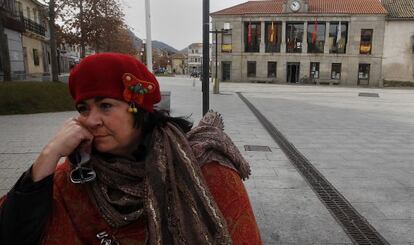Maverick mayor refuses to register immigrants who are unemployed
PP powerless to prevent Madrid town chief denying foreigners residency

Robledo de Chavela, a small municipality in northern Madrid, has enormous "ears" placed there by NASA to listen to deep space, but when it comes to aliens' rights, all requests fall on deaf ears. For over two years now, Mayor Mario de la Fuente, of the conservative Popular Party (PP), has refused to allow immigrants without a work contract to register as residents.
He is aware that he is breaking the law; registering is a duty and a right for everyone, the only requirement being proof of residence. "I'm not going to change my mind," says the mayor. "I don't care whether people like it or not. Immigrants without a job can forget about coming here to sponge off us. It's that simple."
Regarding the unlawfulness of his measure, De la Fuente argues that "the Constitution is also being violated, since it says that Spaniards have the right to a job and a decent home. So what are they going to do to me? Nobody follows the rules around here anyway."
"He is not a feudal lord, and I am not a peasant," says Odalys Chamizo Mendoza, a 52-year-old translator and documentary maker from Cuba. Last Thursday, Chamizo attempted to register in Robledo (with an official population of 4,058, of whom 522, or 13 percent, are foreigners) using the rental contract of the apartment where she's been living for a month. But she was refused.
"They told me to talk to the mayor, but I don't want any special favors, just for my constitutional right to be respected," she says. Neither the PP nor the Madrid regional government has managed to get De la Fuente to respect the law. The ombudswoman has received several complaints over this issue, and has decided to file her own complaint before the state attorney because of the "hostile and obstructive attitude" of the local government.
He is not a feudal lord, and I am not a peasant"
The attorney could act ex officio against the mayor of Robledo de Chavela for perversion of the course of justice, but as of press time it had still not made a statement on the issue. Nor was the government of Madrid, also in PP hands, able to convince De la Fuente. A spokesman for the Department of Social Affairs said "we insisted that he respect the law" but admitted the regional executive "has no power" to make him do so. "The commissioner will ask him again personally."
Meanwhile, the Madrid PP's Rights and Guarantees Committee has opened its own investigation into De la Fuente, though for other reasons: he headed a protest march by public servants against the central government's decision to eliminate their Christmas bonus. This committee also "has no power" over the mayor.
A source in the PP said "there is a lot of concern" over the mayor of Robledo, who is considered "peculiar" and "unruly." Kicking him out of the party would be an option, but a "complicated" one: the town works, it is not in debt, and the people appreciate him. In the last local elections, the PP obtained eight of the 11 seats on the local council. So far, nobody has filed a complaint against the mayor of Robledo. Chamizo is not planning to, either. She says she mistrusts the system. "They told me to go to court, but I know I'm not going to get anywhere. There's a lot of corruption everywhere."
De la Fuente is not swayed by the fact that Chamizo has been legally living, working and paying taxes in Spain since 1991, although she's been unemployed since 2009. If right now she is only receiving 426 euros in unemployment aid, then in the mayor's view "she contributes nothing" to the system. Spaniards out of a job do get to register, though. "If they're Spanish, I'll have to support them for life," De la Fuente says.
Chamizo, whose father is Spanish and whose two children were born in Spain, could apply for citizenship, but she won't hear of it. "It would be like renouncing everything I went through, and betraying my parents' memory."
Tu suscripción se está usando en otro dispositivo
¿Quieres añadir otro usuario a tu suscripción?
Si continúas leyendo en este dispositivo, no se podrá leer en el otro.
FlechaTu suscripción se está usando en otro dispositivo y solo puedes acceder a EL PAÍS desde un dispositivo a la vez.
Si quieres compartir tu cuenta, cambia tu suscripción a la modalidad Premium, así podrás añadir otro usuario. Cada uno accederá con su propia cuenta de email, lo que os permitirá personalizar vuestra experiencia en EL PAÍS.
¿Tienes una suscripción de empresa? Accede aquí para contratar más cuentas.
En el caso de no saber quién está usando tu cuenta, te recomendamos cambiar tu contraseña aquí.
Si decides continuar compartiendo tu cuenta, este mensaje se mostrará en tu dispositivo y en el de la otra persona que está usando tu cuenta de forma indefinida, afectando a tu experiencia de lectura. Puedes consultar aquí los términos y condiciones de la suscripción digital.








































